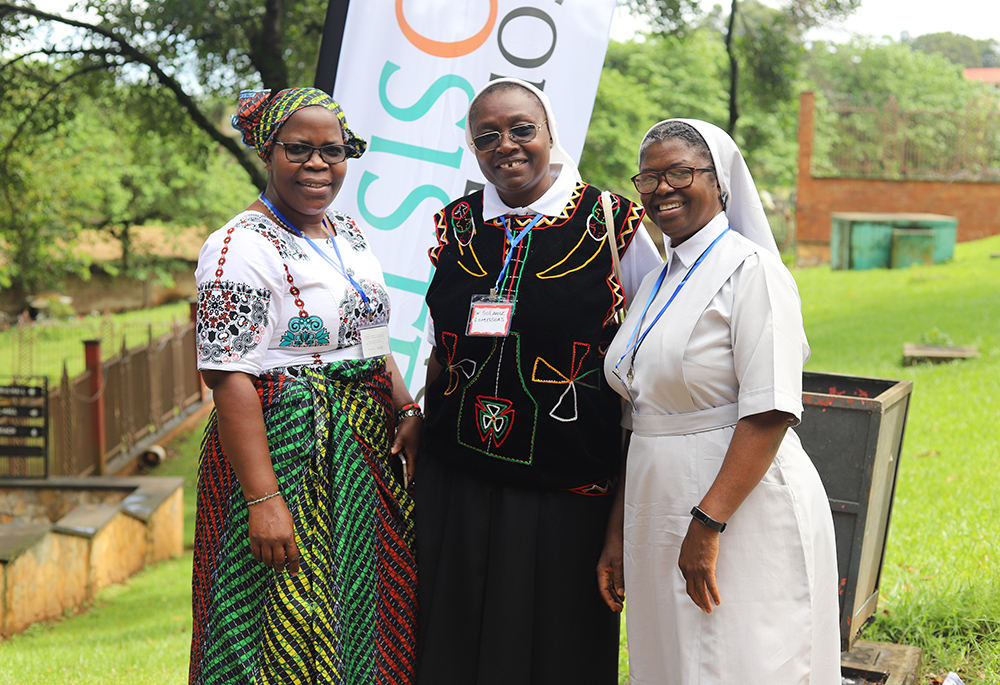
Sr. Eneless Chimbali (left) is pictured with other sisters at the Imperial Botanical Beach Hotel in Entebbe during the All-Africa Conference: Sister to Sister convening in Uganda, April 9. (Doreen Ajiambo)
Dozens of religious sisters gathered from April 7-12 at the Imperial Botanical Beach Hotel in this central town of Uganda to evaluate the success of their various projects and lay out a structure to explore new ways to sustain their ministries.
The plenary, which was organized by the All-Africa Conference: Sister to Sister (AAC: SS), attracted more than 40 delegates from six African countries, including Uganda, Zambia, Nigeria, Cameroon, Zimbabwe and Malawi, as well as the United States.
The delegates, who are primarily religious sisters, likewise used the platform to reflect on their strategic initiatives for 2023-2026 that prioritize collaboration, shared responsibility, and a culture of sustainability. The participants noted that communications and fundraising can be used to sustain their goals and visions, including improving the lives of others.
"Sisters' ministries, especially in Africa, are struggling to survive, and that's why we are here to teach sisters how to make money to support their ministries," Sr. Eneless Chimbali, a senior program officer for AAC: SS, told Global Sisters Report.
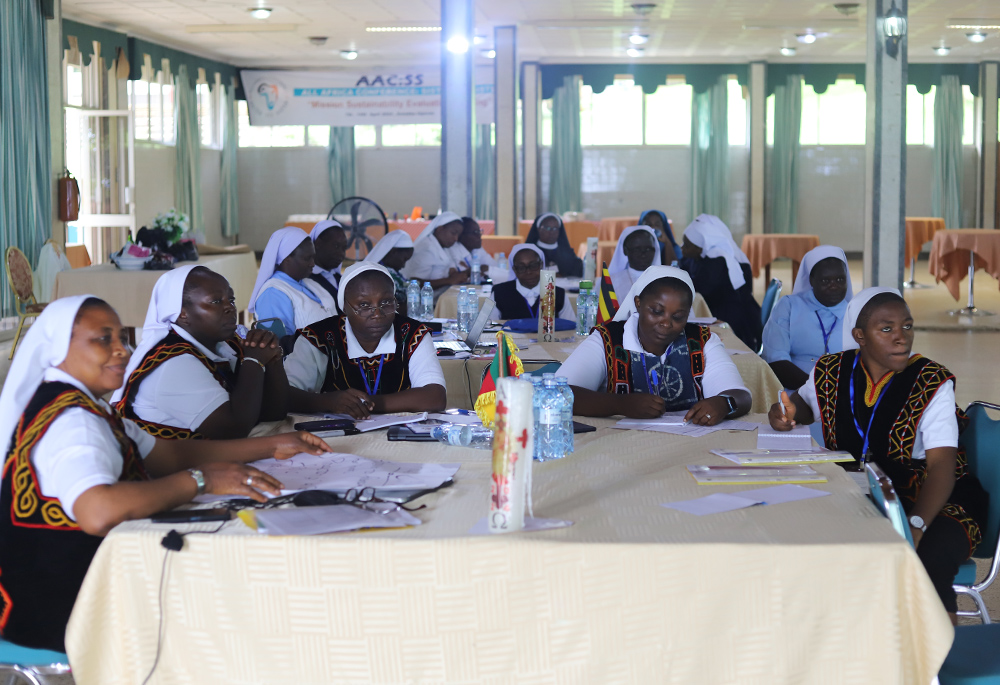
Religious sisters attend sessions during the All-Africa Conference: Sister to Sister convening at the Imperial Botanical Beach Hotel April 9 in Entebbe, a town in central Uganda. (Doreen Ajiambo)
All-Africa Conference: Sister to Sister is a network of six sub-Saharan countries that supports educational and training programs for sisters who are caregivers to those in extreme poverty. The network noted that over 7,000 sisters have attended workshops, conferences and degree programs since it was founded in 2000.
"The sisters bring their knowledge and skills to the millions they lead and serve in hospitals, schools, mental health and social services arenas, and their own religious communities," according to pamphlets the sisters distributed during the plenary.
The meeting in Entebbe, situated about 21 miles south of Kampala, the country's capital, followed a similar gathering that took place in Lilongwe, Malawi's capital, in May 2022, which focused on training and empowering sisters with skills and knowledge on how they can best serve their communities and congregations.
The Lilongwe workshop exposed religious sisters to a wide range of skills and knowledge, including how best to write a grant proposal, report writing, financial accountability, maintaining good rapport with donors, and transparency while dealing with donor funds.
Chimbali, who belongs to the congregation of the Servants of the Blessed Virgin Mary, said their convening theme, "Mission Sustainability," was adopted two years ago and has four broad areas, which include learning business strategies, networking, collaboration and fundraising, with specific goals in each of the areas.
"On the learning business strategies, for instance, the goal is to have sisters adapt to the new business skills that can help them earn an income for themselves and also strengthen the services Catholic sisters provide in areas such as health care, education, and disaster management, entrepreneurship opportunities, and countering human trafficking," she said.
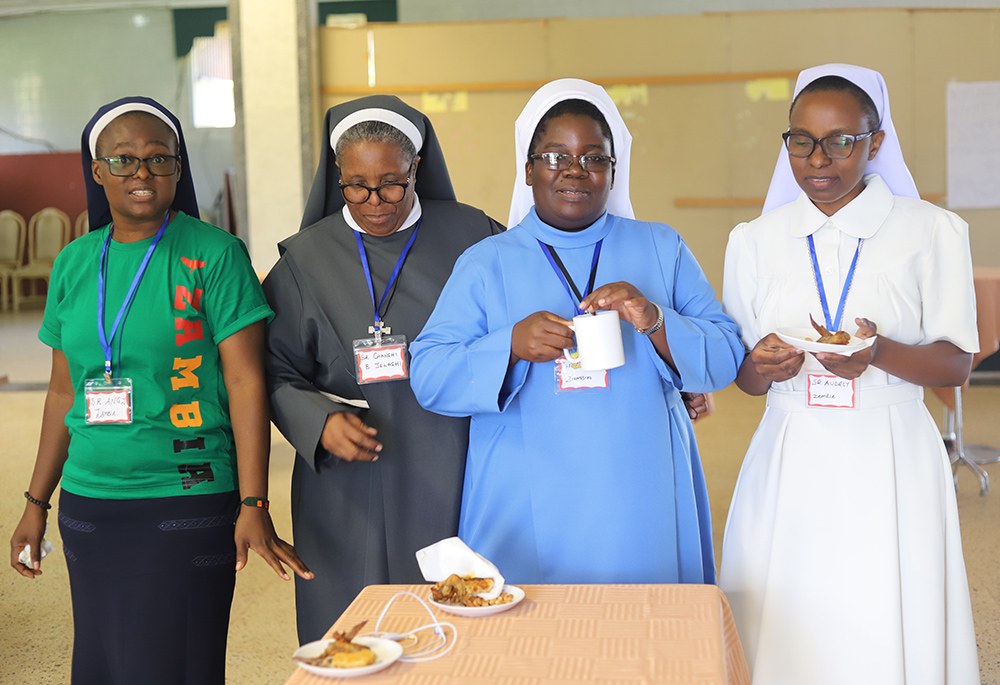
Religious sisters interact during a break at the AAC: SS convening at the Imperial Botanical Beach Hotel in Entebbe, April 9. (Doreen Ajiambo)
Chimbali reminded the gathering to share the knowledge and skills they had received during the plenary with other sisters in their countries to help the network reach out and help more vulnerable communities.
"The formation of AAC: SS was about how the sisters understand their missions and charisms. And for the sisters to do better about the charisms, they need to have finances. So, with "Mission Sustainability," we are teaching the sisters fundraising and communication," she said.
Chimbali, who hails from Malawi, further explained that religious sisters can use many communication tools — including newsletters, press releases, websites, radio, TV, social media, and personal communication — to communicate their mission and reach out to donors to raise money for their various projects.
"We have taught the sisters how they can invite people to share in their mission and how they can collaborate among themselves despite their different charisms for a common goal," she said.
The sisters who attended the convening noted that the ongoing discussion about mission sustainability through communication and fundraising was essential to help them shift from waiting to receive grants to sourcing funds through sharing their purpose and mission.
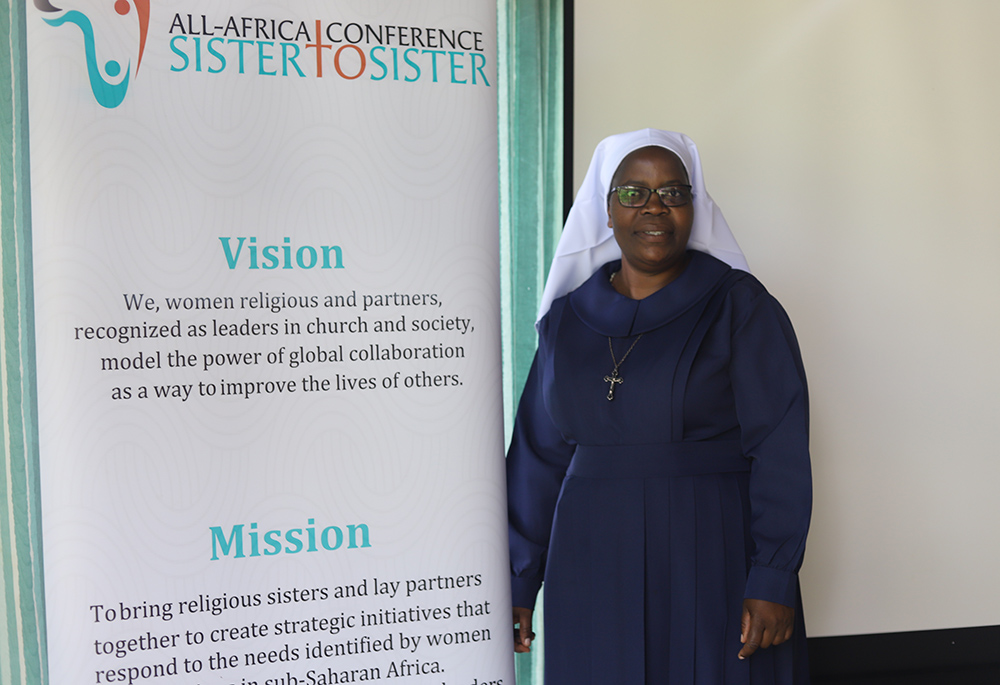
Sr. Eneless Chimbali, a senior program officer for the All-Africa Conference: Sister to Sister, is pictured at the Imperial Botanical Beach Hotel April 10 in Entebbe, a town in central Uganda. (Doreen Ajiambo)
Sr. Felicitas Lukong of the Sisters of St. Therese of the Child Jesus of Buea in Cameroon said she felt blessed and privileged to have attended the plenary and vowed to implement what she had learned to ensure that she increases the ways of fundraising money to support her teaching mission. She also intends to train more sisters, so that all congregations moving forward can fulfill their mission without limits due to lack of funds.
Lukong, also the national coordinator for All-Africa Conference: Sister to Sister in Cameroon, said the training had made her realize the power of collaboration in their pursuit to fulfill their mission.
"This gathering has been a good opportunity for us to work together for the betterment of our missions and service to society," she said, noting that she hopes to use the skills and knowledge gained to raise more money to help vulnerable children access education and help sisters in their ministries. "We are calling for collaboration and networking from all the community members. We want to work together and make a difference."
Advertisement
On her part, Sr. Lucy Esedebe of the Missionary Sisters of Our Lady of Apostles from Nigeria said she came out of the plenary as "a financial planner equipped with skills to help myself and also share with other sisters who did not get a chance to join us."
Esedebe, who runs a community hospital in West Africa, said she learned the virtue of accountability when dealing with donors, as many would seek assurance that their funds will be well spent.
"We have been taught how to account for every money we collect for our missions to foster trust with donors," she said, noting that the trainers taught them about finance and balance sheets. "The session was very fulfilling to me because I learned how to divide the money I get for useful things from expenditure to saving for the future. I have learned how to use the money efficiently and provide clear financial reporting to donors."
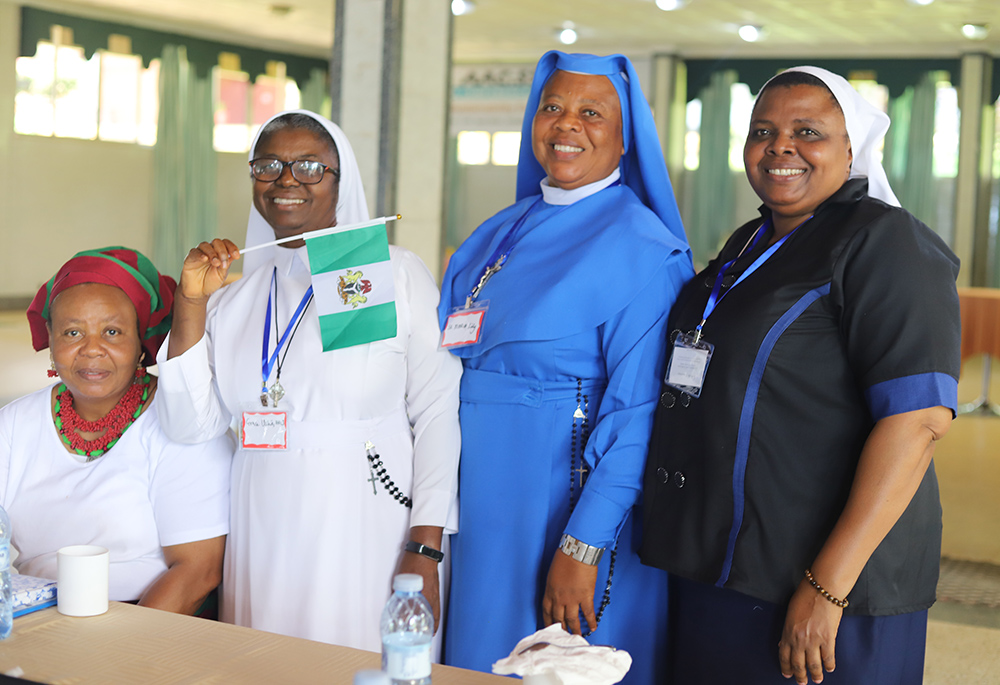
Sr. Lucy Esedebe, left, a member of the Missionary Sisters of Our Lady of the Apostles from Nigeria, and other sisters are pictured during a session at the AAC: SS convening in Uganda, April 10. (Doreen Ajiambo)
In his homily, Fr. Dan Oryema, of the Catholic Diocese of Nebbi in northern Uganda, applauded the efforts by the sisters for the past few years since the Mission Sustainability project was launched and urged them to continue to work toward their objectives.
"I want to appreciate the sisters for the good attitude they have towards projects that help vulnerable communities all over the world," Oryema, who holds his Ph.D. in education from the University of Birmingham and now lectures at Uganda Management Institute, said during the closing Mass of AAC: SS.
"The sisters endure with little resources they have and use them for the good, and this is what God wants," he said.
Meanwhile, Chimbali noted that at the end of the course, sisters could achieve their missions, communicate their stories to people who can help them raise money for their projects and develop workable methods for the future meant to raise money to sustain their ministries.
"I want the sisters to come out of this meeting with practical income-generating activities they can do in their own countries to help create finances to support their missions," she said. "I want the sisters to be able to manage their finances better and work with others with a common goal to sustain their ministries."







